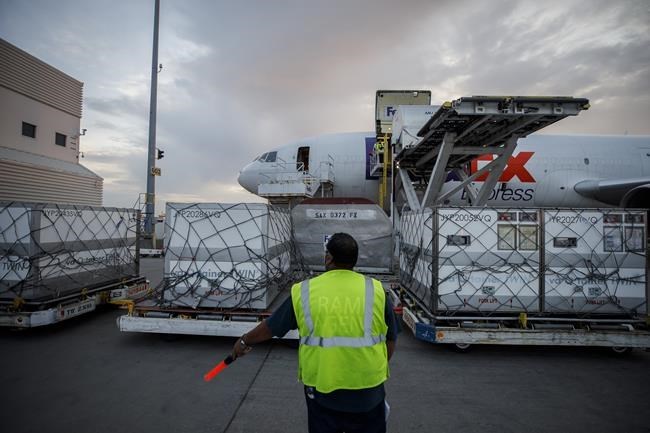OTTAWA — Procurement Minister Anita Anand is pushing Moderna to start shipping its COVID-19 vaccine doses to Canada from the United States instead of Europe.
The negotiations, which also involve the U.S. government, come a month after Pfizer-BioNTech shifted Canada's supply from Europe to the Pfizer plant in Kalamazoo, Mich. Anand said Friday Pfizer will ship more than two million doses a week through to the end of August — and get all 48 million of Canada's doses into the country before Labour Day.
It has also agreed to ship another three million doses in September, bringing Canada's total 2021 supply to 51 million doses.
"I would like to sincerely thank Pfizer for the partnership," Anand gushed at a news conference Friday. "We have a complete delivery scheduled from Pfizer. Pfizer's deliveries arrive on time and are stable. Thank you so much."
She could not say the same to Moderna, which has sent just one-third of its planned spring shipments to date, and hasn't been able to provide any shipment confirmations beyond June 14.
In mid-May both Moderna and Andy Slavitt, a senior adviser to U.S. President Joe Biden on COVID-19, said the company was going to start exporting doses. Initially the U.S. forbade the export of any American-made COVID-19 vaccines until U.S. orders had mostly been fulfilled.
Neither would say where the first exports were going, and the company's spokeswoman told The Canadian Press Thursday there was currently no news on changing the origin of Canada's supply.
But Anand told The Canadian Press in a written statement that Canada is "pressing for deliveries from the company's U.S. facilities."
"I continue to work with Moderna as well as the U.S. government to stabilize its delivery schedule to Canada," she said Friday.
Moderna, which has never had a product on the market before, has provided vague explanations about production delays at its European production lines. The company signed an exclusive agreement with Swiss drugmaker Lonza to make its vaccine in both the U.S. and Europe. The brand new mRNA technology required Lonza to build production lines from scratch.
Anand has been pushing the company for weeks to give her a more reliable shipping schedule, but it hasn't happened.
Moderna announced in February production delays would slow Canada's shipments but was able to fulfil its contract to ship two million doses by March 31 by a matter of hours.
In April, it said a backlog in quality assurance checks in Europe was slowing deliveries once again. It cut the second April shipment in half and warned it may only be able to send 10.3 million doses by the end of June instead of the initially promised 12.3 million.
It has since blamed human resource and material issues for production delays, which have not appeared to affect the U.S. deliveries at all.
Moderna has currently shipped about four million doses since April 1, with another 1.5 million promised June 14. Anand said she expects "millions more" this month but can't say how many or when.
The company is supposed to ship 44 million doses by September, and depending on future uptake of the Oxford-AstraZeneca vaccine, Canada will need Moderna to at least ship half of its remaining allotment to hit the goal of having two doses for every Canadian by the fall.
As of Friday, Canada had given at least one dose to more than 22.7 million people, 2.5 million of whom also have their second dose.
Chief Public Health Officer Dr. Theresa Tam said before outdoor restrictions should be loosened, we should aim to get a first dose to 75 per cent of eligible Canadians — currently those at least 12 years old — and two doses to at least 20 per cent.
Canada needs to give out another two million first doses and 4.1 million second doses to get there.
There will be enough doses delivered by next week to hit that goal but it will likely take another two to three weeks. It will also require bigger shift from first to second doses.
This report by The Canadian Press was first published June 4, 2021.
Mia Rabson, The Canadian Press



